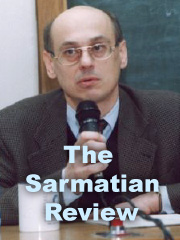| This Issue | Back Issues | Editorial Board | Contact Information |

From the Editor
April 2004
Volume XXIV, No. 2
From the Editor
Professor Krasnodebski's most recent book excerpted in this issue is a ringing defense of Polish Republicanism. Krasnodebski sees Republicanism as being closer to the modern understanding of the relationship between state and individual than the political system that resulted from the Round Table agreements in 1989, or the political systems that gained favor in Prussia and Russia in the eighteenth century. Krasnodebski points out that the Polish system involved principles similar to those which informed the writings of the Founding Fathers of the American Republic: the responsible and free citizens select amongst themselves a representative (called president in America, king in Poland) whose task is to execute the will of society while observing natural law. Thus laws are not a compromise between conflicting interests but an expression of the will of the community united for the common good.
Krasnodebski's book belongs to those important works which outline general tendencies and movements, and as such can be compared to Alexis de Tocqueville's Democracy in America (1838). It is obvious that in outlining tendencies stretching over many centuries and involving millions of people minute documentation cannot be provided, and instead condensed experience of the thinker is brought to bear. It goes without saying that thinkers of Krasnodebski's caliber have proven their mettle in studies that are possessed of a more complete documentation. Professor Krasnodebski's thesis--that much in the recent attempts to "amend the Polish Republic" went wrong, and that the mistakes were largely due to disregard for the Polish Republican tradition and servility to the continental liberal tradition--is profound and important, and it has already generated discussion in Poland starting with the essay by Bronislaw Wildstein in Rzeczpospolita (17 January 2004). Krasnodebski's book echoes Lawrence Goodwyn's thesis in Breaking the Barrier: Solidarity Labor Movement (1991). He maintains that the ability of Polish workers to self-organize and debate was similar to the way debates were conducted at the Polish sejmiks of the seventeenth and eighteenth centuries.
At the same time, it is important to remember that Professor Krasnodebski is a scholar and not a politician, and his way of dealing with the subject is that of a scholar and not a politician.
Krasnodebski writes about Poland's intellectual assets: its history of Republicanism and its collective memory of a Res publica which is the Poles' common good. It will take many books such as Krasnodebski's to bring this portion of history to the attention of Western scholars.
Professor James R. Thompson's comments on Poland's situation in the European Union soberly assess the growing national egoism of EU's largest members. Thompson also outlines a possible realignment of alliances in Europe.
Back to the April 2004 Issue
The Sarmatian Review
sarmatia@rice.edu
Last updated 4/23/04